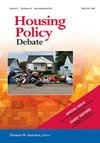Corporate Landlords and Pandemic and Prepandemic Evictions in Las Vegas
IF 2.9
3区 经济学
Q2 DEVELOPMENT STUDIES
引用次数: 0
Abstract
Abstract Research on evictions has found that large landlords are associated with higher absolute and relative numbers of evictions, and pandemic-period filings have brought additional scrutiny to large landlords and corporate landlords in particular. However, not all large landlords are equivalent, and some may be more likely to evict based on the submarkets in which they operate, and the pandemic has likely altered these relationships. This study examines trends in evictions and filings associated with two particular submarkets, extended-stay and single-family rentals, through an analysis of case-level data covering the Las Vegas metropolitan area. Through a series of multivariate analyses, I find that extended-stay properties are associated with higher eviction rates than other multifamily properties during the 12-month period immediately preceding the pandemic. Extended-stay landlords are even more likely to file and evict during the first 12-months of the pandemic. The results are mixed for single-family rentals. Corporate and other large landlords are generally more likely to file and evict prior to the pandemic, but several are no more likely or even far less likely to evict compared to smaller landlords during the pandemic. This study concludes with implications for policy and research.拉斯维加斯的企业房东与疫情和疫情前驱逐
本文章由计算机程序翻译,如有差异,请以英文原文为准。
求助全文
约1分钟内获得全文
求助全文
来源期刊

Housing Policy Debate
Multiple-
CiteScore
5.40
自引率
17.20%
发文量
68
期刊介绍:
Housing Policy Debate provides a venue for original research on U.S. housing policy. Subjects include affordable housing policy, fair housing policy, land use regulations influencing housing affordability, metropolitan development trends, and linkages among housing policy and energy, environmental, and transportation policy. Housing Policy Debate is published quarterly. Most issues feature a Forum section and an Articles section. The Forum, which highlights a current debate, features a central article and responding comments that represent a range of perspectives. All articles in the Forum and Articles sections undergo a double-blind peer review process.
 求助内容:
求助内容: 应助结果提醒方式:
应助结果提醒方式:


